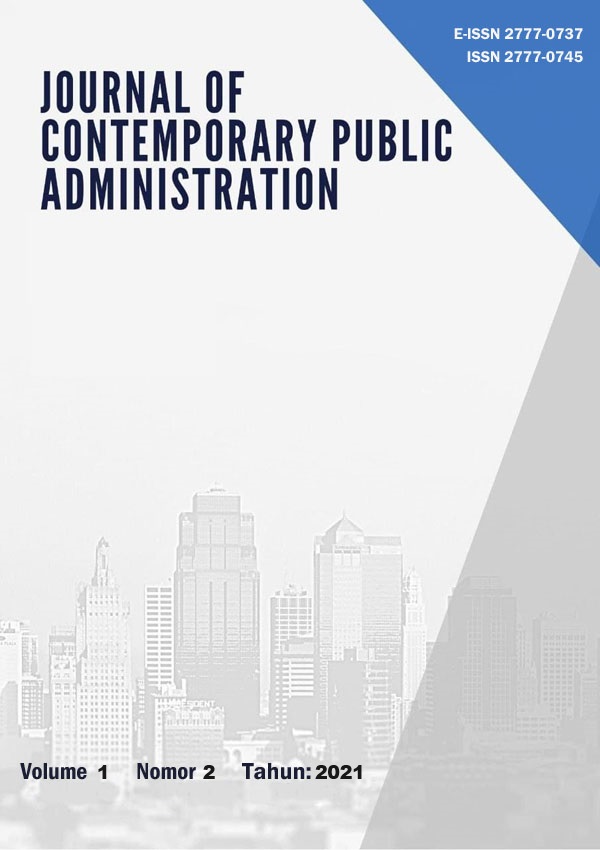Public Administration Science in the Development of Digital Technology
Abstract
The rapid development of digital technology is considered the fourth industrial revolution causing various changes, especially in the science of state administration. By using a qualitative approach, this paper explains how the direction of the development of state administration in Indonesia is currently in the flow of technological change and what challenges it faces. Seeing from the history of the paradigm shift that occurred in the science of state administration, the focus and locus of this science is very important because it can affect the perspective of the development of the science of state administration. The rapid development of technology is feared to be able to shift the central role of humans. For this reason, scientists are required to be able to contextualize the science of state administration and at the same time utilize digital technology to answer the public interest
References
Ansell & Gash. (2017). Collaborative Platforms as a Governance Strategy. Journal of Public Administration Research and Theory, 28(1), 16–32. https://doi.org/10.1093/jopart/mux030
Bollen, J., Pepe, A., & Mao, H. (2009). Modeling public mood and emotion: Twitter sentiment and socioeconomic phenomena. Computers and Society. Retrieved from https://arxiv.org/abs/0911.1583
Cabinet Office https://www8.cao.go.jp/cstp/english/society5_0/index.html diakses tanggal 20 November 2021.
Denhardt, R. B. (1995). Public Administration: An Action Orientation. 2nd Ed. Belmont, CA: Wadsworth Publishing Company.
Dwiyanto, A. (2018). Ilmu Administrasi Publik di Indonesia: Mencari Identitas?. Yogyakarta: Gadjah Mada Press.
Ghufron, M. A. (2018). Revolusi Industri 4.0: Tantangan, Peluang dan Solusi Bagi Dunia Pendidikan. Pada Seminar Nasional dan DIskusi Panle Multidisiplin. In Prosiding Seminar Nasional dan Diskusi Panel Multidisiplin Ilmu. Retrieved from http://proceeding.unindra.ac.id/index.php/dispanas2018/article/view/73/45
Gondecha, P., & Lieu, H. (2012). Mining social media: A brief introduction. INFORMS TutORials in Operations Research, 1-17 Retrieved from https://pubsonline.informs.org/doi/abs/10.1287/educ.1120.0105
McKinsey, C. (2016). Public Sector–Information Technology. Chicago: McKinsey & Company.
OFE. (2015). Managing Change: Transforming Public Services.Manchester, UK: Open Forum Events.
Prayitno, B. (2018). Reformasi Birokrasi dan Revolusi Industri 4.0. Lembaga Administrasi Negara Republik Indonesia. http://lan.go.id/en/lan-news/reformasi-birokrasi-dan-revolusi-industri-4-0 diakses tanggal 20 November 2021.
Rohida, S. (2018). Pengaruh Era Revolusi Industri 4.0 terhadap Kompetensi Sumber Daya Manusia. Jurnal Manajemen Bisnis Indonesia. 6(1), https://doi.org/10.31843/jmbi.v6i1.187
Schintler, L. A., & Kulkarni, R. (2014). Big data for policy analysis: The good, the bad, and the ugly. Review of Policy Research, 31(4), 343–348. https://doi.org/10.1111/ropr.12079.
Seno, T. (2018). Digital Transformation. Dalam kuliah umum yang disampaikan pada kuliah umum yang diadakan Center for Digital Society di FISIPOL UGM Yogyakarta tanggal 28 Mei 2018.
SK Gubernur Bali Nomor: 003.1/8044/PKAP/BKD. From: https://denpasarkota.go.id/assets_subdomain/40/download/SK%20Gubernur%20Bali%20tentang%20Cuti%20Bersama%20dan%20Dispensasi%20Hari%20Raya%20Suci%20Hindu%20di%20Bali%20Tahun%202018_819540.pdf diakses tanggal 4 Juli 2018.
Straunbhaar, J., LaRose, R., & Davenport, L. (2011). Media Now: Understanding Media, Culture and Technology. 7th Ed. Wadsworth Thomson Learning. USA.
Thoha, M. (2011). Birokrasi pemerintah indonesia di era reformasi. Kencana Prenada Media Group.
 Abstract viewed = 259 times
Abstract viewed = 259 times
 PDF downloaded = 647 times
PDF downloaded = 647 times







1.png)



